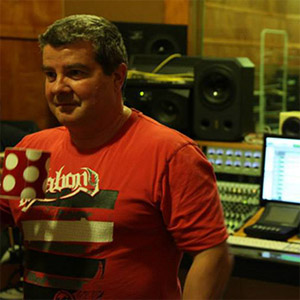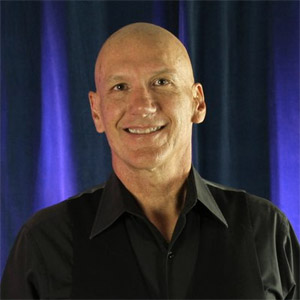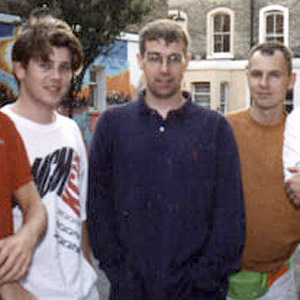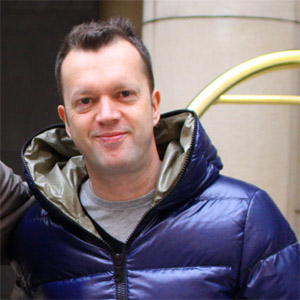Julian Mendelsohn is an engineer, mixer and producer. He remixed several Pet Shop Boys classics,
such as
Heart,
It’s alright,
Suburbia,
Always on
my mind and
This must be the place I waited years to leave (his
extended mix of that song is considered one of the best by fans). He was
producer and/or engineer on their early albums—1986’s
Disco, 1987’s
Actually and 1987’s
Introspective, then he coproduced Liza
Minnelli’s 1989’s album
Results with Pet Shop Boys themselves.
Julian Mendelsohn mixed 1990’s
Behaviour and some B-sides of that
era, and then sort of came back to assist Pet Shop Boys in 1994 in
creating a new radio mix of
Yesterday, when I was mad.
Apart from Pet Shop Boys, he remixed songs from Level 42,
Catatonia, Talk Talk and Peter Gabriel and was an engineer on Kate Bush’s
and ABC’s tracks (among others). He also produced Paul McCartney’s and
Dusty Springfield’s albums. An interesting sidenote: on several occassions
Julian Mendelsohn was engineering and remixing tracks for a group
called... Go West.
Julian Mendelsohn was nominated best producer at 1988
British Awards. He also released his own mini album, told to be very
ambient in style.
The catalogue interview - julian mendelsohn answers questions from psb community forum members:
If you scour the sleeve notes of Pet Shop Boys’ imperial releases, one musician's name appears more than any other, save for Neil and Chris themselves. The UK top 10 singles
Suburbia,
It’s a sin,
Rent,
Always on my mind and
Where the streets have no name / I can’t take my eyes off you all feature
Julian Mendelsohn on production duties, as do
Actually album tracks
One more chance,
Shopping and
Hit music.
When it comes to mixing, many more hits have come past his desk:
What have I done to deserve this?,
Heart,
It’s alright and
Yesterday, when I was mad – as well as numerous extended mixes, and the whole of
Behaviour and associated b-sides
Miserablism and
Bet she’s not your girlfriend.
Add in the co-production of Liza’s
Results and the Boys’ contribution to Dusty’s
Reputation and it’s clear you’re looking at an absolute discography Goliath.
With much of this work due for reissue this year as part of the Catalogue series, Julian kindly took time out from his hectic retirement schedule to answer questions from Community forum members.
Julian on the early days
How did you first get to work with Pet Shop Boys? (Pod)
I was managed by Jill Sinclair [late founder of ZTT records and Sarm studios, and wife of producer Trevor Horn] and she said: “Oh, the Pet Shop Boys want you to rework
Suburbia.”
It was Jill who pushed me into it - I wasn’t too keen to start with, but it was really great fun and
we made a really good record. They’re great to work with, Neil and Chris. It all went really well.
Please tell us about your first meeting; what was your impression of them? (dynamobjornen)
I met them coming out of Jill’s office - I think I met Neil then, I don’t know if I met Chris at the same time. I definitely remember Neil - we had a bit of a yap. They were great guys.
What was your relationship like in the studio? Did you bounce ideas off each other? What was the work process? (MikeyC)
They really had great ideas. Really, really nice to work with. No stress.
I always remember that it was mainly me and Neil running the whole thing, but Chris would come in with extra ideas that just turned it into the big thing that we needed, you know? He was sort of just slightly in the background. Neil and I would be looking for some synth line in the third chorus or something like that and we’d just go: “Chris! Chris! Quick - come on!” And he’d come up, he’d turn on the keyboard, he’d play this thing and that was that - fixed! It was fantastic.
There was a bit of to-ing and fro-ing of ideas. They always came with pretty good demos. The demo always already had a lot of the good stuff in it. A couple of the tracks we might have just started with the demo and gradually replaced stuff, and some other tracks we might have started from scratch but using the demo as a reference.
There’s a real ‘filmic’ quality to many of those early tracks, with the use of sound effects. Was that your idea? (Dog)
They both asked for a lot of that sort of stuff. It was Neil’s idea to make it sort of like a bit of a film.
Did you see a song written, or were you always presented with demos? (Tom Angel)
I don’t remember any writing in the studio.
I was wondering how working with Pet Shop Boys compared to working with, say, Level 42? (Tom Angel)
With Neil and Chris there was never much stress. It was always pretty easy going. Some of the other bands could be a bit stressful.
Having said that Level 42 weren’t stressful. Level 42 were pretty easy going because they were amazing musicians. And really well organised - they knew exactly what they were doing.
Neil and Chris
almost knew exactly what they were doing, most of the time, but there were moments when we had to search for stuff - musical ideas or sounds - but it was never a big deal.
Julian on Actually
What were the Actually sessions like? (Dog)
When it came to doing
Actually they asked me to produce five tracks.
It’s a sin was a little bit of a struggle, because Neil and Chris wanted it ‘epic’ - sort of a massive wall of sound. I remember me and the keyboard programmer Andy Richards spent a couple of nights without them, trying to get stuff going. Neil and Chris were happy to leave us doing stuff in the night - they’d go off out for dinner and they’d say: “We’ll see you in the morning - and we hope you’ll have something for us!” [laughs]
So they’d come in the morning with fresh ears, because it’s always really important to have fresh ears. When you’re working on something quite intensely you can lose your focus and go up the wrong tree. So they’d normally come in in the morning and say: “Yep, that’s great!” or “Change that!” or “No, you haven’t got it!” or something like that.
They didn’t want to get too intense with it but at the same time they wanted to be hearing it fresh, rather than listening to it over and over again.
What about What have I done to deserve this?? (Dog)
Stephen Hague did the record so I only came in at the end [to mix the track]. What actually happened was that I’d done a mix of
It’s a sin and then I went away on holiday - I think I went for a big holiday because I was really stuffed. But my mix wasn’t quite right, so they got Stephen to do the mix of
It’s a sin, and he did a couple of really great little things in it, and then when I got back his mix of
What have I done to deserve this? wasn’t quite right so I did the mix of his production of
What have I done to deserve this? and we actually swapped the royalties on it. We came to an agreement - you take this and I’ll take that.
It was
quite an easy mix,
What have I done to deserve this? Not long-winded, it was pretty quick.
What did you bring to the mix that wasn’t in Stephen’s version? (Dog)
I think it was to do with the vocal. More to do with the way the vocal sat in the track but I can’t remember for sure.
I know for sure on
Relax [Frankie Goes To Hollywood uber-hit], Stephen Lipson had done lots of mixes of
Relax but there was never quite one that was right for the single, because the vocal wasn’t sitting in the track properly.
I did a mix of it with Trevor really early one morning, absolutely last minute. It only took three hours and that was the one that was the single played on the radio, because the vocals sat in the track properly.
So, I think Dusty was the same situation.
As the story goes, when mixing the album version of Heart you wiped out some tracks by accident. What happened exactly? (BlackPanther)
Oh, I did - that’s right! [laughter] Of course, I did! Now, how did I get round that? I got round it somehow - nobody ever knew. Let me get it up on YouTube - I might just have a quick listen to the intro. I want the album version do I? [clicks] Isn’t it amazing, modern technology? Hang on - single version,
album version… Here we go - it’s coming. We haven’t got broadband down here yet.
[Listens to intro] See - that’s so funny - I would never have guessed there was a c***-up on that. Something was erased -
let me just listen to the single version. [Listens some more] Well, that’s interesting isn’t it? If that had happened with Trevor Horn I would have been sacked! But with Neil and Chris it was like, oh well, we’ll sort something out, it’ll make it different!
What was the process like to turn the demo of Always on my mind into a perfect pop song? (Actually)
I think
they did a demo of it and
we just embellished the demo. Some of it was new; some of it was old. A lot of it was the original. Chris did his normal thing, when we needed an extra bit. I can’t remember if we redid the vocal.
It only took an afternoon, it was very quick. I remember the studio, we did it in studio three at Sarm in the afternoon. It was done by six or seven o’clock.<
Julian on remixing
The versions of It's alright mixed by you (and released on The Alternatives 10") contain elements of both the album version and Trevor Horn’s final single version. The single version could very well have been a remix of your version, but you're not credited on it. Can you elaborate on the story behind your mixes? (BlackPanther)
That’ll be Trevor - the longest possible route to getting a result! [laughs] Let me just find it [clicks]. Hang on [
single version begins playing]. Ah, yeah… It’s very Trevor.
[Clicks some more - plays his
extended dance mix]. Is that the one? Crikey. It sounds like mine. I didn’t know Trevor got involved in my mix. He has a very convoluted way of working [huge laugh]. He’s a genius but oh my god you do do a lot of work to get to where you want to go, if you know what I mean?
I haven’t heard that for a long time. Some things I never listen to after I’ve done it, because I’ve had enough of it by the time I’ve finished with it [laughs]. Also, you can’t appreciate it. When you’ve worked on something, you can’t listen to it and think: “Wow, that’s really good.” You just go: “Shit, I wish I’d done this,” and “I wish I’d done that.” And funnily enough I notice that if I get to the end of a job and I think: “Wow, that’s really good,” it’s not really good. If I get to the end of a job and I say: “Crikey, it’s no good - I’ve got to do this, and I’ve got to do that,” normally it’s really good. It’s a very strange thing! [laughs]
Was doing extended mixes just part of the job of being a producer in the 80s for you? Were there aspects about it you missed going into the 90s when DJs took over that job? (fac23)
Funnily enough a few years ago I did quite a few extended mixes for a girl called
Catcall. She was on quite a big label here [Ivy League Records]. There was one called
Swimming Pool -
have a listen to it, it’s a traditional 80s extended mix. I really sweated that out because I’d never done one on Pro Tools before; I’d never done it on the computer. It was always on tape and chopping bits together. I reckon it’s pretty good - it was critically acclaimed.
Yes, I miss doing those mixes. They were hard work. You really had to think. But I do miss doing that sort of stuff. Once you get the hang of it on Pro Tools it’s really easy to do. You can do things on that that would just be a nightmare to do on tape.
There was one Go West [the band, rather than the Pet Shop Boys track] mix of the track
Call Me. That was an epic 12 inch and we spent four or five days on it and one bit, we wanted to loop up just the verse part on the multitrack so that they could jam along and do extra stuff on top of it. We ended up with two inch tape running all the way round the control room, all looped, hanging on mic stands. It was ridiculous! [laughs]. Whereas if you wanted to do that on Pro Tools it would be done within 10 seconds. It’s amazing now. I love digital. All these youngsters that think analogue’s a fantastic thing, god… I’d never go back to analogue.
Did you get full autonomy when remixing Pet Shop Boys? (fac23)
No, no, it was a group thing. Neil and Chris, or sometimes just Neil. And they always had ideas for the mixes.
Are there particular production techniques and musical elements that you employ when approaching remixing work? Is there a Julian Mendelsohn style and approach? (Paul J)
It just depends on the track so much. It depends on the opportunities you’ve got on the multitrack tape. It depends what sort of ingredients you’ve got to muck around with.
It’s always important to get the groove right though. The rhythm is the most important thing.
Julian on working with Liza and Dusty
Do you consider Results to be, in a way, a proper Pet Shop Boys album sung by another artist? Do you think I want you now, If there was love or Don't drop bombs could have been hits for the Boys if they released them with Neil singing? (York Minster)
Liza was a lovely lady. A really nice lady. She was in the studio most of the time we were making the album.
But I can’t help thinking that it would have been a better album if Neil had sung it. I know it would have been a hit album if it had been a Pet Shop Boys album because there were a couple of really great tracks. When I heard the demos with Neil singing I thought: “Wow!” There were some great tracks which in my opinion sounded better with Neil singing on them.
I want you now is a great track.
I might have to have a quick listen [starts up
I want you now]. There was a Fairlight programmer called Gary Maughan that worked on this. Andy Richards worked on the record as well.
That
Twist in my sobriety [
starts up track]. They left me and Gary to do the backing track on this. We just went completely mad and they came back in the morning and said: “Yep, that sounds pretty good.” They wanted it big and sort of crashing and aggressive. Yeah, that was good fun.
It was an interesting record to do.
You were credited as co-producer on the record. Was that different to just being the sole producer? Is it a different dynamic? (Dog)
Nah. All exactly the same.
What was working on the tracks for Dusty’s Reputation album like? (Pod)
I didn’t do too much on the record [Julian is credited as co-producing five tracks of the album, alongside Pet Shop Boys]. There was a really, really great 12 inch of
Daydreaming - I listen to it in the car quite often. That’s a really great 12 inch. One of my favourites. There was quite a lot of input from Neil on that one. Dusty did a rap in it, didn’t she? That was Neil’s idea. Yeah, that was really good. [
Begins playing track] Yeah, yeah, one of my favourite 12 inches that I’ve done.
Hearing Dusty’s voice was amazing. I was thrilled to work with her. A very lovely lady but it could be quite hard work working with her. Quite painful at times. But you knew you’d get an amazing result at the end.
Dusty was very much the perfectionist. When we did the vocal for
Nothing has been proved we’d run the track and she’d do one line and then she’d say: “No, no,” and me and Neil would go: “Oh my god." This went on for a couple of days. She’d get further each time. Because she had a plan as to how she was going to do all the nuances of her vocal and the plan was a story of nuances all the way through the song - so if she got an early one wrong she couldn’t go any further. We ended up with about 20 tracks of vocal that we had to sift through and turn into the main vocal. That’s quite a big job.
But I think she trusted us. Because she had a lack of confidence she tended to like somebody to sort it out for her and make the decisions.
But she’s one of my favourite female singers of all time. Her voice is amazing. You hear Dusty and it can only be her.
Julian on Behaviour and beyond
It's been mentioned that you didn't like the sound of Behaviour - can you tell us more about mixing the record? (jamie1978)
That was an interesting one. I was concerned with the sound quality. It was a very strange recording. It wasn’t so much the keyboards or anything - I think it might have been the mixing desk they used. It was just a weird sound. And I never found out why - I was just too busy at the time. I would have been really interested to see what it was recorded on though. Maybe an old Soundcraft desk?
It was really difficult to mix. Not because of the music or the arrangements but because of the sound. It was really hollow and didn’t seem to have much presence. Very strange.
I’m just going to have a quick listen to refresh my memory. [Starts up
Being boring] It doesn’t sound too bad on here. I remember it now. It was hard. Anyway, it was still a good record with lots of good songs.
I’d like to know more about the nine minute extended mix of This must be the place I waited years to leave. (fluffmoln)
[Searches for the track] I won’t have heard this for a long time. Crikey. Only 28 years ago. [
Listens] I remember it. I remember the song. I might get myself a copy - it’s good!
[Listens some more] Well, I probably haven’t listened to that since I did it. Unfortunately I don’t like downloading stuff. I’m not a big mp3 man. I wonder where I can get a copy of that from? Maybe I’ll just have to put up with an mp3. I like at least CD quality. And now I’m getting into FLACs which are lossless. My car has a fantastic sound system - the best I’ve ever had in a car. I’ll have to look for that because that sounded really good.
What was the last Pet Shop Boys song you worked on? (Tom Angel)
I did
Where the streets have no name. That was a medium hit [it reached number four in the UK chart]. It was funny because after it was released and played on the radio quite a bit we got an email from Bono saying: “What have I done to deserve this?”! [laughs] We just thought that was fantastic. [more laughter]
And then I did
Yesterday, when I was mad with them. It wasn’t really that great. I didn’t really enjoy that. It wasn’t one of my favourites. It just didn’t do it for me for some reason. That wasn’t a big hit was it? [it reached number 13 in the UK chart]. Anyway, there you go.
Julian on his career with Pet Shop Boys
Which Pet Shop Boys sessions do you have the fondest memories of? (Pod)
Definitely Always on my mind and Actually. They were very memorable. Always on my mind because it was so fast and it was a massive hit record. And doing Actually was just really good fun. Because I had done a lot of stuff with Trevor which could be hard work [laughs]. Working with Neil and Chris was a breath of fresh air. Because they weren’t stressed about anything. They just quietly had all the hooks, all the right songs. It was great.
Are there any Pet Shop Boys songs you worked on that stand out as being particularly hard going? (TallThinMan)
It’s a sin was quite hard going. It was quite intense. And doing
Behaviour was hard going because of the sound quality.
Are there any Pet Shop Boys tracks that you were part of that listening back to now you would want to tweak or change in some way? (y3potential)
Not so many now. It would usually take me two or three years after I’d finished a track to be able to listen to it objectively. There are some Nik Kershaw tracks I listen to now and I think: “Jesus, the voice isn’t loud enough.” But not so many Pet Shop Boys tracks.
What more recent Pet Shop Boys songs would you like to have worked on? (y3potential)
I would have loved to have worked on all of their records. Because they’re great to work with. No lack of ideas there. They’ve always got the good songs, and the good hooks. Chris is the man for the hooks.
Julian on life right now
Do you work more with plugins these days? What is your view on the convenience of software versus messing with hardware? Or are you as much drawn to using new tech as when you first started in studios? (Paul J)
I’ve got an old system - my poor old Apple G5 can’t handle too much going on. It gets very upset. When I first got Pro Tools I’d have plugins in almost every channel and it would be well over-complicated - I’ve learnt now just to keep it dead simple. Dead simple. I mean I love my Pro Tools but some of the kids they just can’t stop putting four plugins on each channel and I think: “Oh, god.” But that’s the modern technology - I just keep it very simple. And even if I had a powerful computer I would still work the same way.
It’s all in the balance. The most important thing on a record is the balance. More than the individual sounds. In my opinion. I learnt that lesson a long, long time ago, before I worked with the Pet Shop Boys.
What was the last music project you worked on? (Tom Angel)
I’m sort of semi-retired. In fact I’m more than semi-retired. There’s a New Zealand band that live in Melbourne called
The Glorious. We’ve done four albums now. It keeps me going.
I was a bit busier a few years ago. I just like to do a little bit here and there on my own terms, if you know what I mean.
I’m a very busy man in my retirement [laughs]. You’d be amazed by how busy I am - it’s ridiculous! And all my friends have retired - Christ - there’s so much going on! What am I doing? I thought I was retired!
Are you still in touch with Neil and Chris? (Dog)
I’m still in touch with Neil. Chris keeps to himself a lot.
Neil tells me that they might be coming out here [Australia] late this year. I’m just hoping we can go out for a feed or something. I know he loves his grub. There are plenty of good places to eat in Melbourne. It’d be great to catch up with him again. He’s a great guy.
Interview by Chris Payne, February 2018.




